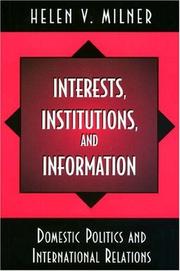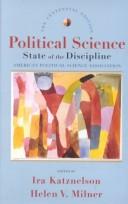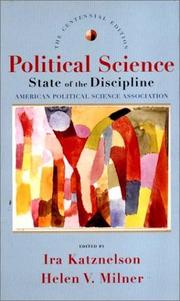| Listing 1 - 10 of 19 | << page >> |
Sort by
|

ISBN: 069101177X 0691011761 0691214492 9780691011769 9780691011776 Year: 1997 Publisher: Princeton (N.J.) Princeton university press
Abstract | Keywords | Export | Availability | Bookmark
 Loading...
Loading...Choose an application
- Reference Manager
- EndNote
- RefWorks (Direct export to RefWorks)
Interests, Institutions, and Information examines the central factors that influence the strategic game of domestic politics. It shows that it is the outcome of this internal game - not fears of other countries' relative gains or the likelihood of cheating - that ultimately shapes how the international game is played out and therefore the extent of cooperative endeavors. The interaction of the domestic actors' preferences, given their political institutions and levels of information, defines when international cooperation is possible and what its terms will be. Several test cases examine how this argument explains the phases of a cooperative attempt: the initiation, the negotiations at the international level, and the eventual domestic ratification. The book reaches the surprising conclusion that theorists - neo-Institutionalists and Realists alike - have overestimated the likelihood of cooperation among states.
International relations. Foreign policy --- #SBIB:327.1H10 --- #SBIB:327.7H01 --- #SBIB:AANKOOP --- Internationale betrekkingen: theorieën --- Grondslagen, principes, evolutie internationale gemeenschap --- #A0206PO --- Information policy. --- International relations. --- Nation-state. --- World politics --- Information policy --- International relations --- Nation-state --- Information science --- Information services and state --- Communication policy --- National state --- State, The --- National interest --- Self-determination, National --- Coexistence --- Foreign affairs --- Foreign policy --- Foreign relations --- Global governance --- Interdependence of nations --- International affairs --- Peaceful coexistence --- World order --- National security --- Sovereignty --- Government policy --- INTERNATIONAL RELATIONS. --- CASE STUDIES. --- STATES. --- POLITICAL COOPERATION. --- International co-operation. --- Information. --- States. --- International politics. --- Foreign policy. --- Politics. --- Política interna. --- Política internacional. --- Relações internacionais. --- Rationele keuze. --- Politieke instellingen. --- Binnenlandse politiek. --- Internationale samenwerking. --- Theorie --- Nationalstaat --- Internationale Politik --- Interessenpolitik --- World politics. --- Accords internationaux. --- CED = Communaute europeenne de defense. --- Politique de l'information. --- Politique internationale. --- Relations internationales. --- UE/CE CECA. --- UE/CE Traite de Maastricht. --- Unions economiques et monetaires. --- 89.70 international relations: general. --- 89.71 international cooperation: general. --- Information --- Politique mondiale --- Nation. --- Politique gouvernementale. --- Colonialism --- Global politics --- International politics --- Political history --- Political science --- World history --- Eastern question --- Geopolitics --- International organization --- Belgium. --- Bundesbank. --- Chicago Convention. --- Democrats (US). --- Evans, Peter. --- Frieden, Jeffry. --- German rearmament. --- Jacobson, Harold. --- Keohane, Robert. --- Keynes Plan. --- Laver, Michael. --- Lijphart, Arendt. --- Milner, Helen. --- Obstfeld, Maurice. --- Phillips curve. --- Putnam, Robert. --- Rogowski, Ronald. --- Schelling conjecture. --- Truman Administration. --- absolute gains. --- amendment power. --- balance of payments. --- capital mobility. --- cartel. --- domestic politics. --- hierarchy. --- independents. --- interest groups. --- legislature. --- parliamentary systems. --- ratification. --- side payments. --- two-level games. --- World politics - 1989 --- -Information policy --- VIE INTERNATIONALE --- POLITIQUES PUBLIQUES --- REGLES INTERNATIONALES --- POLITIQUE ECONOMIQUE EXTERIEURE --- ORGANISATIONS INTERGOUVERNEMENTALES --- REGIMES INTERNATIONAUX --- Interessenvermittlung --- Lobbyismus --- Interessenverband --- Internationale Beziehungen --- Politische Beziehungen --- Zwischenstaatliche Beziehungen --- Weltpolitik --- Außenpolitik --- Internationales politisches System --- Nationalstaaten --- Staat --- Nationale Einheit --- Praxis
Book
ISBN: 0691056706 Year: 1988 Publisher: Princeton, N.J. Princeton University Press
Abstract | Keywords | Export | Availability | Bookmark
 Loading...
Loading...Choose an application
- Reference Manager
- EndNote
- RefWorks (Direct export to RefWorks)
Foreign trade policy --- Free trade --- International business enterprises. --- International trade. --- Protectionism --- Tariff --- Case studies.
Book
ISBN: 9780691214498 Year: 2021 Publisher: Princeton, NJ
Abstract | Keywords | Export | Availability | Bookmark
 Loading...
Loading...Choose an application
- Reference Manager
- EndNote
- RefWorks (Direct export to RefWorks)
Book
ISBN: 9780691225289 Year: 2022 Publisher: Princeton, NJ
Abstract | Keywords | Export | Availability | Bookmark
 Loading...
Loading...Choose an application
- Reference Manager
- EndNote
- RefWorks (Direct export to RefWorks)

ISBN: 0393978710 9780393978711 Year: 2002 Publisher: New York, N.Y. W.W. Norton & Company
Abstract | Keywords | Export | Availability | Bookmark
 Loading...
Loading...Choose an application
- Reference Manager
- EndNote
- RefWorks (Direct export to RefWorks)
Politics --- State, The --- Political science
Book
ISBN: 9780691165479 0691165475 9780691174815 0691174814 Year: 2015 Publisher: Princeton Oxford Princeton University Press
Abstract | Keywords | Export | Availability | Bookmark
 Loading...
Loading...Choose an application
- Reference Manager
- EndNote
- RefWorks (Direct export to RefWorks)
When engaging with other countries, the U.S. government has a number of different policy instruments at its disposal, including foreign aid, international trade, and the use of military force. But what determines which policies are chosen? Does the United States rely too much on the use of military power and coercion in its foreign policies? Sailing the Water's Edge focuses on how domestic U.S. politics--in particular the interactions between the president, Congress, interest groups, bureaucratic institutions, and the public--have influenced foreign policy choices since World War II and shows why presidents have more control over some policy instruments than others. Presidential power matters and it varies systematically across policy instruments. Helen Milner and Dustin Tingley consider how Congress and interest groups have substantial material interests in and ideological divisions around certain issues and that these factors constrain presidents from applying specific tools. As a result, presidents select instruments that they have more control over, such as use of the military. This militarization of U.S. foreign policy raises concerns about the nature of American engagement, substitution among policy tools, and the future of U.S. foreign policy. Milner and Tingley explore whether American foreign policy will remain guided by a grand strategy of liberal internationalism, what affects American foreign policy successes and failures, and the role of U.S. intelligence collection in shaping foreign policy. The authors support their arguments with rigorous theorizing, quantitative analysis, and focused case studies, such as U.S. foreign policy in Sub-Saharan Africa across two presidential administrations. Sailing the Water's Edge examines the importance of domestic political coalitions and institutions on the formation of American foreign policy.
Executive power --- Presidents --- Decision making. --- United States --- Foreign relations --- Military policy --- Decision making --- 1945-1989 --- 1989 --- -United States --- -Executive power --- -Executive power - United States --- Presidents - United States - Decision making --- United States - Foreign relations - Decision making --- United States - Military policy - Decision making --- United States - Foreign relations - 1945-1989 --- United States - Foreign relations - 1989 --- Executive power - United States
Book
ISBN: 9780691140285 9780691140278 0691140286 0691140278 Year: 2009 Publisher: Princeton Princeton university press
Abstract | Keywords | Export | Availability | Bookmark
 Loading...
Loading...Choose an application
- Reference Manager
- EndNote
- RefWorks (Direct export to RefWorks)
Since they were pioneered in the 1970s by Robert Keohane and others, the broad range of neoliberal institutionalist theories of international relations have grown in importance. In an increasingly globalized world, the realist and neorealist focus on states, military power, conflict, and anarchy has more and more given way to a recognition of the importance of nonstate actors, nonmilitary forms of power, interdependence, international institutions, and cooperation. Drawing together a group of leading international relations theorists, this book explores the frontiers of new research on the role of such forces in world politics. The topics explored in these chapters include the uneven role of peacekeepers in civil wars, the success of human rights treaties in promoting women's rights, the disproportionate power of developing countries in international environmental policy negotiations, and the prospects for Asian regional cooperation. While all of the chapters demonstrate the empirical and theoretical vitality of liberal and institutionalist theories, they also highlight weaknesses that should drive future research and influence the reform of foreign policy and international organizations. In addition to the editors, the contributors are Vinod Aggarawal, Jonathan Aronson, Elizabeth DeSombre, Page Fortna, Michael Gilligan, Lisa Martin, Timothy McKeown, Ronald Mitchell, Layna Mosley, Beth Simmons, Randall Stone, and Ann Tickner.
Non-governmental organizations. --- International agencies. --- International relations. --- Organisations non-gouvernementales --- Organisations internationales --- Relations internationales --- Non-governmental organizations --- International agencies --- International relations --- Organisations non gouvernementales --- Acteurs non étatiques (relations internationales) --- #SBIB:327.7H01 --- #SBIB:327.7H06 --- Coexistence --- Foreign affairs --- Foreign policy --- Foreign relations --- Global governance --- Interdependence of nations --- International affairs --- Peaceful coexistence --- World order --- National security --- Sovereignty --- World politics --- Associations, International --- IGOs (Intergovernmental organizations) --- Institutions, International --- Intergovernmental organizations --- International administration --- International associations --- International governmental organizations --- International institutions --- International organizations --- International unions --- Organizations, International --- Specialized agencies of the United Nations --- International cooperation --- Interorganizational relations --- Non-state actors (International relations) --- International organization --- INGOs (International agencies) --- International non-governmental organizations --- NGOs (International agencies) --- Nongovernmental organizations --- Organizations, Non-governmental (International agencies) --- Private and voluntary organizations (International agencies) --- PVOs (International agencies) --- Nonprofit organizations --- Grondslagen, principes, evolutie internationale gemeenschap --- Internationale organisatietheorieën --- Organisations non gouvernementales. --- Organisations internationales. --- Inter-governmental organizations
Book
ISBN: 3847414887 3847423320 Year: 2019 Publisher: Leverkusen Verlag Barbara Budrich
Abstract | Keywords | Export | Availability | Bookmark
 Loading...
Loading...Choose an application
- Reference Manager
- EndNote
- RefWorks (Direct export to RefWorks)
Digitalization is not only a new research subject for political science, but a transformative force for the discipline in terms of teaching and learning as well as research methods and publishing. This volume provides the first account of the influence of digitalization on the discipline of political science including contributions from 20 different countries. It presents a regional stocktaking of the challenges and opportunities of digitalization in most world regions.
Political science --- Study and teaching. --- digital age --- digital changes --- digital transformation --- digitalisation --- digitalization --- political digitalisation --- political digitalization --- political science

ISBN: 9780393051421 Year: 2002 Publisher: [s. l.] : W. W. Norton & Company,
Abstract | Keywords | Export | Availability | Bookmark
 Loading...
Loading...Choose an application
- Reference Manager
- EndNote
- RefWorks (Direct export to RefWorks)
State, The --- Political science --- Etat --- Science politique
Book
ISBN: 9781400873821 Year: 2015 Publisher: Princeton, NJ
Abstract | Keywords | Export | Availability | Bookmark
 Loading...
Loading...Choose an application
- Reference Manager
- EndNote
- RefWorks (Direct export to RefWorks)
| Listing 1 - 10 of 19 | << page >> |
Sort by
|

 Search
Search Feedback
Feedback About UniCat
About UniCat  Help
Help News
News